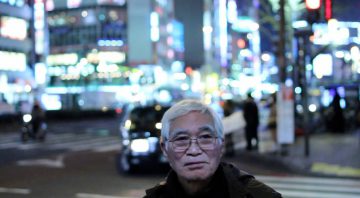“It May Be That Beauty Has Strengthened Our Resolve: Masao Adachi” by Philippe Grandrieux. November 7, 2012
It May Be That Beauty Has Strengthened Our Resolve: Masao Adachi (Il se peut que la beauté ait renforcé notre résolution – Masao Adachi) dir. Philippe Grandrieux | France 2011 | 72 min. | video | 14A
“[According to the poet Schiller] … the work of art introduces the observing individual to a moral emancipation: the individual sees, thanks to the work of art, how beauty is delivered from all constraints and is nurtured solely by freedom.” —Nicole Brenez
The first in a planned series of films about radical filmmakers by film critic Nicole Brenez and filmmaker Philippe Grandrieux, It May Be That Beauty Has Strengthened Our Resolve is a portrait of Masao Adachi, who emerged during the Japanese New Wave of the 1960s as a screenwriter for Nagisa Oshima and Koji Wakamatsu, and directed a series of avant- garde films that grafted radical politics to the sexploitation genre. A 1971 visit to a Popular Front for the Liberation of Palestine (PFLP) training camp while on the way back from Cannes resulted in Adachi’s most infamous film, the agit-prop documentary Red Army/PFLP: Declaration of World War, which he co-directed with Wakamatsu. Soon after, Adachi joined a splinter cell of the Japanese Red Army in Lebanon, where he stayed from 1974 until he was deported to Japan in 1997 to serve time for passport violations.
Grandrieux’s portrait follows Adachi through a twilit Tokyo, with gorgeously underlit, nearly narcotic images reinforcing the mystery of Adachi’s steely inner resolve. Adachi’s whispered words serve as a dialogue on the notion of art and revolution—for him never a contradiction—and a reflection on the possibilities of film to create both beauty and change.
Co-presented with www.reelasian.com
Wednesday, November 7, 2012 7:00 pm
